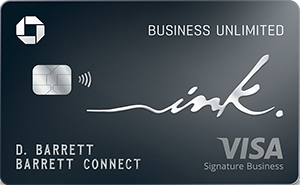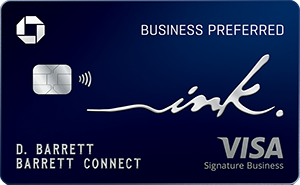So you’ve got a small business idea. No matter what kind of business you have, whether it’s a retail business, a consumer-facing product business, or a professional services business, whether you sell B2B (“business to business”) or D2C (“direct to consumers”), many new small business owners face some of the same hurdles along the way.
Let’s look at a few of the biggest challenges in starting a small business, and how you can solve these problems.
1. Forming an LLC or other legal business entity
If you want to make your business “official” in the eyes of the law, you need to form a limited liability company (LLC), S Corporation, or other legal business entity.
Business Credit Card Comparison
Consider these business credit cards that offer a convenient and efficient way to separate personal and business expenses, simplifying accounting and tax reporting.
Additionally, business cards can provide valuable perks such as rewards points, cashback, and expense tracking tools, enhancing financial management and the potential to help save money in the long run.

Ink Business Unlimited® Credit Card |
|
Earn $750 bonus cash back Earn $750 bonus cash back after you spend $6,000 on purchases in the first 3 months from account opening. |
Earn unlimited 1.5% cash back on every purchase Earn unlimited 1.5% cash back on every purchase made for your business |
Purchases: 0% Intro APR on Purchases, 12 months Balance Transfers: N/A
Regular: |

Ink Business Preferred® Credit Card |
|
Earn 100,000 bonus points Earn 100,000 bonus points after you spend $8,000 on purchases in the first 3 months from account opening. |
Earn 3 points per $1 in select business categories Earn 3 points per $1 on the first $150,000 spent in combined purchases on travel, shipping purchases, Internet, cable and phone services, advertising purchases made with social media sites and search engines each account anniversary year. Earn 1 point per $1 on all other purchases-with no limit to the amount you can earn. |
Purchases: N/A Balance Transfers: N/A
Regular: |
Forming a legal business entity can help you establish a separate identity for your company that is different from your personal identity and personal finances. It lets you get an Employer ID Number (tax identification number, like a Social Security number for your business). And it can help you save time (and money) at tax season, by making it easier to track your business expenses.
LLCs and other business entities are formed at the state level. You have to file official paperwork with your state government, often called “Articles of Incorporation” or “Articles of Formation,” depending on the state. If you want to form an LLC (or other legal business entity), you can do it yourself by contacting your state’s Office of the Secretary of State or other business regulatory filings agency.
You don’t have to hire a lawyer or an accountant to form an LLC for you. Some people like to pay for professional help to make sure the details are done correctly, but it’s not required. There are also LLC formation services that can help you, for a fee. CorpNet, Bizee, and LegalZoom are a few examples of online business formation services.
Disclosure: I used to do freelance writing projects for Bizee (formerly Incfile) and CorpNet.
2. Opening a business bank account
Once you’ve set up your LLC or other business entity and gotten an Employer ID Number from the federal government, you can open a business bank account. Getting a business checking account gives you a home base for your business finances, a dedicated place for your business revenue to go. Some of the best business checking accounts even pay interest. You can also apply for a business credit card to help pay bills and manage expenses for your business.
Opening a business bank account is generally not too hard, as long as you have an Employer ID Number for your business. That’s the big step that banks will need you to take, so your business has its own legal identity for tax purposes. And keep in mind that as a new business owner, you will likely have to personally guarantee any business credit card.
3. Getting a small business loan
Your business (being new) doesn’t have any established credit history of its own, and so this can make it difficult to get a small business loan. Many banks prefer to see a few years of revenue and tax returns before they will issue a conventional small business loan to your company.
Small Business Administration (SBA) loans are another option if you can’t get approved for a conventional bank small business loan, but the underwriting process can be slow. You also might consider non-bank alternative lenders (or “platform lenders”) that issue small business loans and lines of credit online, with fast underwriting and more immediate approvals if you qualify. But be aware that platform lenders might charge higher interest rates than a conventional bank business loan.
4. Marketing your business
Perhaps the most important challenge of starting a business is making sales, marketing the business, and finding customers. Even if you already have a strong product-market fit, even if you’re already seeing strong demand for what you sell, as the business owner, you need to make marketing and sales your full-time job.
Here are three key small business marketing concepts to keep in mind.
1. Keeping existing customers is cheaper than finding new customers
The cost of acquiring a new customer is often much higher than just keeping your existing customers happy. Repeat business and word-of-mouth referrals are priceless. If your current customer base loves your business, they will tell the world about you.
2. Automate your marketing — but keep the human touch
There are great marketing automation software tools that can help you send emails, track your customer relationships, manage social media, and more. But don’t outsource everything to software. Make it easy for customers to talk to a real person. Keep providing human-centered service that makes people feel appreciated.
3. Marketing is learning
The more you learn about your customers and your market, the better. What do people need now? What are people complaining about? What problems and “pain points” can your business solve? The faster you learn, the more you can sell.
Bottom line
Starting a business is one of the greatest adventures and most exciting 24-hour-a-day learning experiences in life. It’s not always easy, and sometimes it can be lonely and difficult and exhausting. But like any labor of love, the rewards you get out of it are (hopefully) worth the blood, sweat, and tears you put in.
And if your business succeeds, if you can find a market for your products or services, if you can create a sustainable base of recurring revenue…it’s one of the greatest feelings in the world. You’ll have one of the richest rewards of all: an independent, diversified source of income. And you’ll enjoy a freedom-filled way of life that no boss can take away from you.
Alert: our top-rated cash back card now has 0% intro APR until 2025
This credit card is not just good – it’s so exceptional that our experts use it personally. It features a lengthy 0% intro APR period, a cash back rate of up to 5%, and all somehow for no annual fee! Click here to read our full review for free and apply in just 2 minutes.
